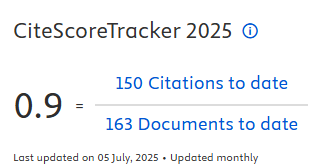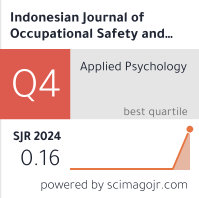Factors Related to Work Stress among Health Office Employees during Covid-19 Pandemic
Downloads
Introduction: Study related to work stress is usually more focused on the industrial sector. Meanwhile, workers in other sectors such as the government organization also have the potential to feel stressed due to their job. During the COVID-19 (Coronavirus Disease) pandemic, Health Office is one of the main stakeholders in handling and preventing COVID-19. The COVID-19 pandemic can cause work stress due to unachieved health programs and huge demands to develop programs related to this pandemic. This study analyzed the relationship between individual factors, work factors, and factors outside of work with level of work stress among Health Office employees. This study is expected to be able to analyze work stress and its determinant as early as possible. Methods: This study was a cross-sectional study using the Depression, Anxiety, Stress Scale 42 (DASS-42) and NIOSH (National Institute for Occupational Safety and Health) Generic Job Stress Questionnaire instrument. This study was conducted at the Public Health Office Bogor Regency April 2021. This study used total sampling method on employees of the Public Health Office Bogor Regency with total sample collected of 135 respondents. Data analysis in this study was performed using multiple logistic regression. Results: 86.67% of respondents did not experience work stress, 5.93% of respondents had mild work stress, and 7.41% of respondents experienced moderate work stress. Moreover, workload (p = 0.0001) and social support (p = 0.011) had a significant relationship in increasing work stress. Conclusion: Workload was the most dominant variable affecting work stress in which workers who had high subjective workload were 33.63 times more stressful compared to workers who had the appropriate workload. Prevention of occupational stress can be done by adjusting workloads and building a good social environment between colleagues.
Keywords: factors outside of work, health office, individual factors, work factors, work stress
Akbar, K. A. (2020) "Kepuasan Kerja Karyawan di Dinas Kesehatan Kabupaten X Provinsi Jawa Timur Saat Pandemi Covid-19,” Jurnal Kesehatan, 11(3), pp. 336–344.
Anggrianti, S. M., Kurniawan, B. and Widjasena, B. (2017) "Hubungan Antara Postur Kerja Berdiri Dengan Keluhan Nyeri Kaki Pada Pekerja Aktivitas Mekanik Section Welding Di PT. X,” Jurnal Kesehatan Masyarakat (Undip), 5(5), pp. 369–377.
Astuti, I. (2018) Hubungan Antara Kepribadian dengan Kepatuhan Minum Obat Anti Tuberkulosis-Studi Analitik Observasional Terhadap Penderita TB Paru di Rumah Sakit Islam Sultan Agung Semarang Periode Januari 2015–Maret 2017. Undergraduate Thesis. Semarang. Faculty of Medicine, Universitas Islam Sultan Agung.
Benua, M. G. N., Lengkong, V. P. K. and Pandowo, M. H. C. (2019) "Pengaruh Gaya Kepemimpinan, Konflik Interpersonal dan Mutasi Kerja Terhadap Stres Kerja Pada PT. Pegadaian (Persero) Kanwil V Manado,” Jurnal EMBA: Jurnal Riset Ekonomi, Manajemen, Bisnis dan Akuntansi, 7(3), pp. 3968–3707.
Dafinci, W. O., Meiliani, M. and Kananlua, P. S. (2020) "Studi Tentang Stres Kerja yang Berdampak Pada Kinerja Karyawan,” The Manager Review, 2(2), pp. 32–51.
Damayanti, H. and Mursid, A. (2021) "Pengaruh Occupational Stress dan Psychological Contract terhadap Work Engagement Melalui Psychological Well Being di Saat Pandemi Covid 19 (Studi pada Karyawan KCP Bank Jateng Pasar Johar),” Magisma: Jurnal Ilmiah Ekonomi dan Bisnis, 9(1), pp. 12–26.
Damayanti, R. and Nawawinetu, E. D. (2019) "Determinant Factors of Work Stress among Teaching and Non Teaching Staff in Indonesia,” Indian Journal of Public Health Research & Development, 10(3), pp. 307–311.
Gupita Bayuwega, H., Wahyuni, I. and Kurniawan (2016) "Faktor-Faktor yang Berhubungan dengan Stres Kerja pada Anggota Polisi Satuan Reserse Kriminal Polres Blora,” Jurnal Kesehatan Masyarakat (Undip), 4(4), pp. 2356–3346.
Hamzens, F. and Sofwati, I. (2017) Faktor–Faktor yang Berhubungan dengan Stres Kerja Pada Perawat di Ruang Rawat Inap Kelas III RS X Jakarta Tahun 2017. Undergraduate Thesis. Jakarta: Faculty of Medicine and Health Science, Universitas Islam Negeri Syarif Hidayatullah.
Hasanah, L., Rahayuwati, L. and Yudianto, K. (2020) "Sumber Stres Kerja Perawat Di Rumah Sakit,” Jurnal Persatuan Perawat Nasional Indonesia (JPPNI), 3(3), pp. 111–128.
Health & Safety Executive (2018) Work Related Stress, Depression or Anxiety Statistics in Great Britain, 2018. London: Health and Safety Executive.
Ihsan, A. A., Ariffin, Z. and Dewi, M. S. (2018) "Pengaruh Stres Kerja Dan Beban Kerja Terhadap Turnover Intention (Studi Pada PT. Bank Syariah Mandiri, Cabang Banjarmasin),” JTAM Jurusan Manajemen FEB ULM: JIMI, 1(2), pp. 152–166.
Jaharuddin, N. S. and Zainol, L. N. (2019) "The Impact of Work-Life Balance on Job Engagement and Turnover Intention,” The South East Asian Journal of Management, 13(1), pp. 106–118.
Jiang, Y. et al. (2019) "Prevalence of Stress And Its Determinants among Residents Enrolled in China Standardized Training Program For Resident Doctor (C-STRD) Program: A Cross-Sectional Study,” PLoS One, 14(1), p. e0207258.
Jundillah, Z. N. et al. (2017) "Analisis Kejadian Stres Kerja pada Perawat di Kabupaten Konawe Kepulauan Tahun 2017,” Jimkesmas: Jurnal Ilmiah Mahasiswa Kesehatan Masyarakat, 2(6), pp. 1–11.
Juninda, M. (2019) Faktor Yang Berhubungan Dengan Stres Kerja Pada Pekerja Di Pt. Pupuk Iskandar Muda Aceh Tahun 2019. Undergraduate Thesis. Medan. Faculty of Public Health, Institut Kesehatan Helvetia.
Juwita, K. and Arintika, D. (2018) "Dampak Konflik Peran terhadap Stres dan Kepuasan Kerja Karyawan PT. Jombang Intermedia Press (Jawa Pos Radar Jombang),” Jurnal Manajemen Indonesia, 18(2), pp. 105–115.
Karina, Z. and Sodik, M. A. (2018) Pengaruh Dukungan Sosial Terhadap Kesehatan. OSF Preprints.
Klaiber, P. et al. (2021) "The Ups and Downs of Daily Life During COVID-19: Age Differences in Affect, Stress, and Positive Events,” The Journals of Gerontology: Series B. Oxford University Press US, 76(2), pp. e30–e37.
Lady, L., Susihono, W. and Muslihati, A. (2017) "Analisis Tingkat Stres Kerja dan Faktor-Faktor Penyebab Stres Kerja pada Pegawai BPBD Kota Cilegon,” Journal Industrial Servicess, 3(1b), pp. 191–197.
Lambert, E. G. et al. (2017) "Exploring The Association Between Different Types of Social Support with Role Stress, Work–Family Conflict, and Turnover Intent among Private Prison Staff,” Journal of Applied Security Research, 12(2), pp. 203–223.
Lestari, W. and Zamralita, Z. (2018) "Gambaran Tuntutan Pekerjaan (Job Demands) dan Dukungan Pekerjaan (Job Resources) pada Pegawai Institusi X DKI Jakarta,” Jurnal Muara Ilmu Sosial, Humaniora, dan Seni, 1(2), pp. 134–143.
Lutfida, T. (2020) Dinamika Stress Masa Pandemi. PsyArXiv.
Marshanty, Y. A., Wardani, I. A. K. and Sari, J. D. E. (2019) "Hubungan Beban Kerja Mental, Masa Kerja dan Usia terhadap Kejadian Stres pada Pekerja Perusahaan Akuakultur di Banyuwangi,” Journal of Community Mental Health and Public Policy, 2(1), pp. 1–11.
Mohamedkheir, R. A. et al. (2016) "Occupational Stress Among Nurses Working in Intensive Care Units in Public Hospitals of Khartoum State, Sudan 2016,” American Journal of Health Research, 4(6), pp. 166–171.
Monday, I. F. and Sunday, I. E. (2020) "Occupational Stress, Physical Work Environment and Psychological Well-Being: The Experience of Bank Employees,” Gender & Behaviour. IFE Centre for Psychological Studies, 18(2), pp. 15382–15389.
Nugroho, B. Y. S. (2019) Pentingnya Penerapan K3 di Perkantoran. Semarang: Informasi Kesehatan Udinus.
Nugroho, M. A. (2021) Pengaruh Beban Kerja dan Kecerdasan Spiritual terhadap Burnout pada Dosen dengan Tugas Tambahan. Undergraduate Thesis. Surabaya. Fakultas Psikologi dan Ilmu Kesehatan. UIN Sunan Ampel.
Nurlitasari, N. (2017) Psychological Capital Pegawai Kontrak Ditinjau dari Jenis Kelamin di Dinas Cipta Karya dan Tata Kota Samarinda. Doctoral Dissertation. Semarang. Faculty of Science Education. Universitas Negeri Semarang.
Nuzulawati, M. T. (2016) "Hubungan antara Kepribadian Tipe A dengan Stres Kerja pada Guru SMK Abstrak,” Jurnal Proyeksi, 11(1), pp. 15–23.
Padkapayeva, K. et al. (2018) "Gender/Sex Differences in the Relationship between Psychosocial Work Exposures and Work and Life Stress,” Annals of Work Exposures and Health. Oxford University Press, 62(4), pp. 416–425.
Pasiak, P. (2020) "Pengembangan Karier Aparatur Sipil Negara (ASN) Berdasarkan Sistem Merit Menurut Undang-Undang Nomor 5 Tahun 2014 Tentang Aparatur Sipil Negara pada Pemerintah Kota Bitung,” Lex Administratum, 8(2), pp. 31–42.
Peristianto, S. V. (2021) "Religiusitas Tenaga Medis dalam Persiapan New Normal Setelah Masa Pandemi Covid-19,” Psisula: Prosiding Berkala Psikologi, 2, pp. 388–400.
Pirom-on, P. and Charoenarpornwattana, P. (2016) "Work-Life Balance In A Selected Surgery Clinic In Chonburi,” E – Proceeding International Conference in Innovative Business and Entrepreneurship 2017, 2(1), pp. 148–155.
Purnama, K. W., Wahyuni, I. and Ekawati, E. (2019) "Faktor-Faktor yang Berhubungan dengan Stres Kerja pada Pegawai Negeri Sipil Badan Penanggulangan Bencana Daerah (BPBD) Kota Semarang,” Jurnal Kesehatan Masyarakat (e-Journal) , 7(4), pp. 246–253.
Purwanti, D. and Nurhayati, M. (2017) "Pengaruh Iklim Organisasi dan Tipe Kepribadian terhadap Stres Kerja dan Perilaku Kewargaan (Studi pada Karyawan Klinik Laboratorium Prodia Cabang Menteng, Jakarta),” Jurnal Manajemen, 20(2), pp. 293–309.
Puspitasari, M. D. and Kustanti, E. R. (2020) "Hubungan Antara Persepsi Beban Kerja dengan Stress Kerja pada Air Traffic Controller di Perum LPPNPI Airnav Indonesia Cabang Madya Surabaya,” Jurnal Empati, 7(1), pp. 113–118.
Putri, F. J. (2020) Faktor-faktor yang Berhubungan dengan Stres Kerja pada Perawat di Rumah Sakit: Sebuah Tinjauan Sistematis. Undergraduate Thesis. Palembang: Public Health Study Program, STIK Bina Husada Palembang.
Ravari, A. K. et al. (2020) "The Effectiveness of A Time Management Workshop on Job Stress of Nurses Working in Emergency Departments: An Experimental Study,” Journal of Emergency Nursing, 46(4), pp. 548.e1-548.e11.
Reppi, B., Sumampouw, O. J. and Lestari, H. (2020) "Faktor-faktor Risiko Stres Kerja pada Aparatur Sipil Negara,” Sam Ratulangi Journal of Public Health, 1(1), pp. 33–39.
Rifai, R. P. (2019) "Pengaruh Konflik Peran dan Ambiguitas Peran Terhadap Kinerja Karyawan dengan Stres Kerja Sebagai Variabel Intervening Pada PT. Bank SulutGo,” Jurnal Riset Bisnis dan Manajemen, 7(4), pp. 339–350.
Riyadi, A. et al. (2020) Dinamika Pendekatan Dalam Penangananan Covid-19. Edited by M. Nasrudin. Pekalongan: Penerbit NEM
Saleh, L. M., Russeng, S. S. and Tadjuddin, I. (2020) "Manajemen Stress Kerja: Sebuah Kajian Keselamatan dan Kesehatan Kerja dari Aspek Psikologis pada ATC,” Yogyakarta: Deepublish.
Saraswati, M. (2017) Faktor-Faktor Yang Berhubungan Dengan Stress Kerja Pada Teknisi Pesawat Terbang Unit Base Maintenance Di PT. X Tahun 2017. Undergraduate Thesis. Jakarta. Faculty of Medicine and Health Science, Universitas Islam Negeri Syarif Hidayatullah.
Sedana, I. G. N. A. (2018) Hubungan Tingkat Stres dengan Perilaku Pencegahan Stroke Pada Klien Hipertensi di Puskesmas I Denpasar Timur Kota Denpasar Tahun 2018. Diploma Thesis. Denpasar. Nursing Major, Poltekkes Denpasar.
Shogunle, M. D. (2020) "Job Stress and Employees' Performance: Evidence from Manufacturing Industries in Lagos, Nigeria,” Hallmark University Journal Of Management & Social Sciences, 2(2), pp. 36–49.
Shrivastava, A. (2020) "Identifying and Analyzing Occupational Stress Factors among Faculty of Autonomous Colleges in Madhya Pradesh,” Academic Leadership (Online Journal), 21(04).
Sinclair, R. R. et al. (2020) "Occupational Health Science in the Time of COVID-19: Now more than Ever,” Occupational Health Science, 4(1), pp. 1–22.
Singh, T. and Choudhary, S. (2018) "Organisational Justice, Experiencing Interpersonal Conflict and Employee Engagement: A Moderated Mediation Analysis,” Journal of Organisation and Human Behaviour. Publishing India Group, 7(1), pp. 1–10.
Sorongan, J., Suoth, L. F. and Boky, H. (2018) "Hubungan Antara Stres Kerja dan Upah dengan Produktivitas Kerja pada Pegawai di Dinas Kesehatan Kota Manado,” Jurnal Kesmas, 7(5), pp. 1-8.
Sudarmanto, E. et al. (2021) Manajemen Konflik. Edited by R. Watrianthos. Medan: Yayasan Kita Menulis.
Suparman, H. (2017) "Pentingnya Penerapan Program K3 Perkantoran dalam Meningkatkan Kualitas Kinerja Sekretaris,” Konferensi Nasional Ilmu Sosial dan Teknologi, 1(1), pp. 613–618.
Usup, H. (2017) "Pengembangan Karier Aparatur Sipil Negara, Pada Dinas Perhubungan Komunikasi Dan Informatika Kabupaten Bolaang Mongondow,” Jurnal Administrasi Publik, 3(046), pp. 1-8.
Wardanis, D. T. (2018) "Analisis Beban Kerja Tenaga Rekam Medis Rumah Sakit Bedah Surabaya Menggunakan Metode FTE,” Jurnal Administrasi Kesehatan Indonesia, 6(1), pp. 53–60.

In order to be accepted and published by The Indonesian Journal of Occupational Safety and Health, Author(s) who submit an article should complete all the review process. The copyright of received articles assigned to the The Indonesian Journal of Occupational Safety and Health and Department of Safety and Health, Universitas Airlangga as publishers of the journal. The intended copyright includes the rights to publish articles in various forms (including reprints).
The Editorial Team of The Indonesian Journal Of Occupational Safety and Health and Department of Safety and Health strive to ensure that no errors occur in the articles that have been published, both data errors and statements in the article.
Users of this website will be licensed to use materials from this website following the Creative Commons Attribution-NonCommercial-ShareAlike 4.0 International License. No fees charged. Please use the materials accordingly.
------------------------------------------------------------------------------------------------------------------------------------------------------------------------------------------
Attribution ” You must give appropriate credit, provide a link to the license, and indicate if changes were made. You may do so in any reasonable manner, but not in any way that suggests the licensor endorses you or your use.
NonCommercial ” You may not use the material for commercial purposes.
ShareAlike ” If you remix, transform, or build upon the material, you must distribute your contributions under the same license as the original.







 How to Submit Articles in OJS
How to Submit Articles in OJS

























